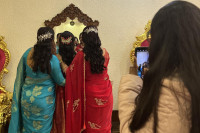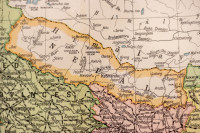Culture & Lifestyle
Sustaining traditional justice with new rules
The close-knit Santhal community is finally opening up to state mechanisms, after a long history of discrimination..jpg&w=900&height=601)
Binu Timsina
A group of men gather around in an open space in the village, which the Santhal community calls Manjhithan. A Gudit, someone who is assigned responsibility similar to that of the police, brings forward the parties in conflict. Manjhihadaam, who is regarded as a king within the community, announces the issue of the dispute in front of the crowd. Both parties are then made to present their case, after which the villagers chip in their views. It is then up to the Manjhihadaam to come to a fair decision.
This is how justice is served among the Santhal people, a close-knit community spread across Morang, Jhapa, and Sunsari districts in Province 1. This system, known as Manjhi, is spearheaded by a Manjhihadaam. The ethnic group likes to keep among themselves and have their own justice system for civil cases like divorce, domestic disputes, polygamy, land ownership disputes, among others, which has led to members of the community refraining from reaching out to the state’s legal system. They neither file police complaints nor seek assistance from local representatives.
“As this tradition has been going on for generations, our faith in our system is strong. That’s why we prefer going to Manjhihadaam to seek justice,” says 45-year-old Munsi Tudu, a local of Jahada Rural Municipality, who has never been to a police station and doesn’t intend to go in the future either.
Although many still hold the tradition of Manjhihadaam superior, community members are trying to modernise the system and raise awareness of legal remedies offered by the state for serious or criminal offences within the community.
The majority of people from Santhal community work as daily wage labourers and do not own any land of their own. According to Uttam Bhattarai, former campus chief of Damak Multiple Campus in Jhapa, they were denied citizenship from the state until the 2006 democratic movement. This not only further marginalised the ethnic minority but also left them feeling ostracised.
“Without citizenship, they could not buy any land,” says Bhattarai, who grew up near Santhal community in Gauradaha, Jhapa. “It is true that they like to keep to themselves. Not just the justice system, but they rarely used to go to schools or even doctors.”
But he adds that it wasn’t just because they were a traditional community. They were discriminated by both the society and state, which may have led them to refrain from making any attempt to reach out to any of these avenues.
“People from other communities also didn’t hold back from cheating this marginalised group,” he says. “But when you are denied citizenship, you are made to feel that you don’t belong to the state or the community. They had no choice but to rely on their own traditional systems.”
Manjhihadaam, therefore, also became the only option for the members of Santhal community when they had any disagreements or conflicts within themselves.
The system is so deeply ingrained that many in the community have an unwavering belief that what the Manjhihadaam says is the ultimate truth. “Manjihadaam is like a king. His decisions have always been fair,” says Chanimuni Mistri, a 60-year-old local.
The comparisons of a Manjhihadaam with the monarchy isn’t just defined by the traditional social system, where a king is taken as a supreme institution that offers justice. In the Santhal community, the title of Manjhihadaam is hereditary. After the demise of a Manjhihadaam, his eldest son assumes the title. But in the absence of a son, it is passed on to another person, which is decided by the village elders.
And although the system is passed on father-to-son, it is not autocratic, say community members. If anyone is unconvinced with the decisions of the Manjhihadaam, they do have the option to state their disagreement.
After the first sitting in Manjhithan, after the Manjhihadaam delivers the decision, both the parties are asked if they are satisfied with the verdict. If one or both the parties disagree with the decision, a second meeting is held. During the second hearing of the case, people from the neighbouring villages are invited and the case is reopened. The second hearing is called ‘mode manjhi baisi’ or ‘kule muchet baisi’ in the native tongue.
The parties can disagree to accept the second verdict as well. If they do so, or the hearing doesn’t come to a conclusion, the case is then taken to ‘Labir’. In the Santhal community, Labir consists of many Manjihadaams and people from the neighbouring villages.
“Labir comes to a decision somehow,” says Ramji Hasda of Choti Bairiya in Jahada Rural Municipality, who has been the leader of the community for the last 15 years.
In all of these hearings, however, women from the community are forbidden to participate. The community members say that both men and women are equally involved during discussions of the case before it reaches Manjhithan, but when the Manjhihadaam gives his verdict, they aren’t allowed to attend.
“During the verdict and the resolution, both parties can be aggressive and utter demeaning words. That’s why we don’t encourage female participation,” says Hasda.
But the younger generation say this particular provision needs revision.
“It’s sad we are not allowed to be part of it. I wish they could also make us see and be a part of the process,” says Sunita Karmakar, a 15-year-old student.
According to her, the tradition is part of their culture but with changing times, it is important to engage women during public hearings as well.
In recent years, in order to make this system more organised, gender-friendly and robust, the Santhal community has decided to form rural municipality level committees. The committee will also work as a bridge between the traditional justice system and the state’s judicial system.
“We are committed to reducing social evils like child marriage, polygamy, witchcraft and others,” says Bhagwanlal Besra, a committee member.
Earlier, even the cases of criminal offences were also resolved via Manjhi system. Community elders, however, have come to believe that such cases should be handled by the state. But in order to encourage the community to do so, the newly formed committee has taken the responsibility to raise awareness among the members.
“We are also planning to train Manjhihadaams of various legal and state systems, so that they can educate their respective groups,” says Surya Narayan Hasda, a local school teacher.
Although a good initiative, this may take some time to be normalised in the community, say local representatives. With no instances or data on any member of the Santhal community ever visiting a police station or local authorities till date is strong proof of the community’s belief in Manjhi system. According to Salo Sah, vice-chairperson and legal committee coordinator at Jahada Rural Municipality, out of a total population of 41,815 within six wards under the municipality, the number of Santhals come to be around 6,200.
“We have already resolved 80 cases but none of them are from the Santhal community,” he says.
District Police Office, Morang Chief Bishwa Adhikari says that they have never arrested anyone from Santhal community for their involvement in any heinous crimes like murder, rape and burglary.
The lack of data, however, is not the evidence of lack of problems within the community, says Manju Kumari Rai, deputy mayor of Sunbarshi in Morang. “I have heard many cases of domestic disputes between husband and wife, even about domestic violence. But they never complain to the local authorities,” she says.
However, apart from such cases, she says she is unaware of any other instances that involve conflict between Santhal community members and other residents. “More than 80 percent of the people from the Santhal community are landless and live below the poverty line,” she says. “And even in the locality, people know them as a peace-loving community.”
Former campus chief Bhattarai says that this is due to the fact that they were historically discriminated and were made to feel inferior in the society. “I have seen people from other communities being violent towards Santhals, but they never registered police complaints,” he says. “They’d rather tolerate than challenge.”
But with the change in state policies towards the community, they have now made efforts to engage in the state mechanism.
“We want the younger generation to learn and preserve our culture,” says Hasda. “But we also want to be forward-looking.”




 18.12°C Kathmandu
18.12°C Kathmandu















